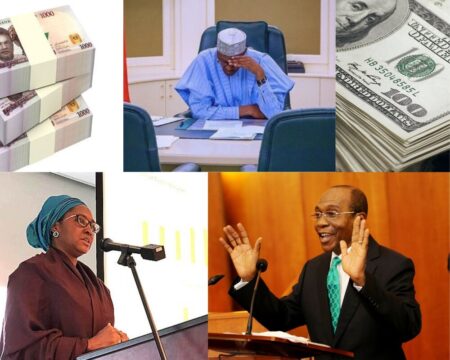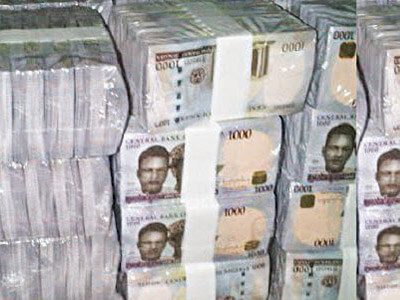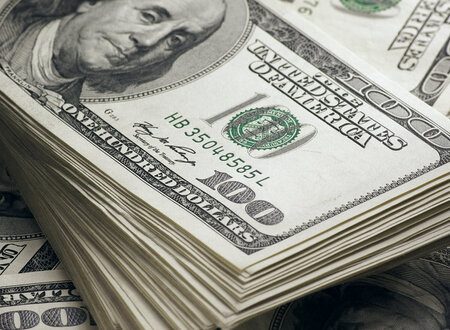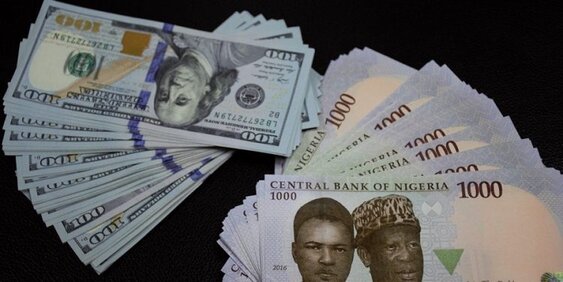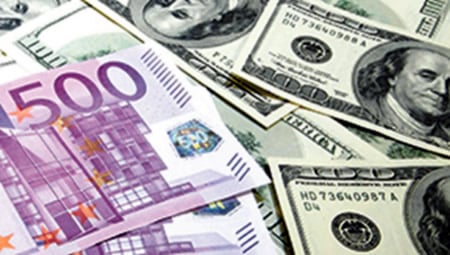Last updated on April 14th, 2023 at 01:26 pm
On November 10, 2021, the governor of the Central Bank of Nigeria (CBN) Godwin Emefiele at the France-Nigeria Security and Economic Summit, in Paris, France, expressed optimism that by the middle of 2022, Nigeria’s foreign reserves will surpass the $42 billion thresholds.
It’s been turbulent for Nigeria’s economy and its foreign exchange market in recent times, but Nigeria’s apex bank boss had consistently boasted that his team is in control and would stabilise the troubled Forex market.
Severally, financial and global economy analysts have accused the Emefiele-led CBN management of defending Naira with Nigeria’s foreign reserves, a policy they said would have consequences on the economy and the naira.
For instance, Leo Ukpong, a Professor of Financial Economics once accused CBN of manipulating the foreign exchange, stating that the gap between the official rate and the parallel rate should worry everyone who has been following Nigeria’s FX market closely.
The world-renowned economist isn’t the first to criticise CBN for defending naira with foreign reserves. World Bank had also cautioned Nigeria’s apex bank, advising it to stop defending the troubled Nigerian currency with its external reserves.
What Are Nigeria’s Foreign Reserves?
Nigeria’s foreign reserves stood at $34.80 billion in the first quarter of 2021, it declined to $33.3 billion in the second quarter, it then rose to $36.7 billion in the third quarter. It is predicted to rise to about $41.82 at the end of 2021, according to data from the National Bureau of Statistics (NBS).
Nigeria’s foreign reserves are assets held on reserve by the Central Bank of Nigeria (CBN) which are used to back liabilities and influence monetary policy.
The external reserves include foreign banknotes, deposits, bonds, treasury bills and other foreign government securities.
Foreign reserves simplified
Foreign reserves or external reserves are like a salary earner who saves part of his monthly salary for rainy days. In case of emergencies, he goes there to withdraw.
On the other hand, another salary earner who has no savings is most likely going to borrow when exigency arises.
“We need external reserves for tomorrow’s expected consumption. We also need to it to caution borrowing, if we consume all our external reserve the cost of borrowing will rise,” Prof. Leo cautioned CBN in an interview by The Punch
Objectives of Nigeria’s Foreign Exchange Reserves:
Nigeria, just like every country of the world, deploys its foreign exchange reserves to perform certain critical roles, which include:
- To ensure that CBN has control over adequate foreign assets to meet national objectives. For instance, if Nigeria needs to finance a project outside Nigeria, the money is there to finance it.
- To act as a backup to face emergencies
- To cautiously use it to purchase domestic currency
- To meet foreign exchange needs and external debt obligations
But the recent uncultured borrowing of the administration of President Muhammadu Buhari has plundered Nigeria’s economy into huge debt, making analysts express fear if the government would be able to pay back the loans it took from China and other countries around the world.
Implications CBN Policy on Naira vs Foreign Reserves:
The CBN has also been defending Naira with external reserves, which have economic consequences that are already giving birth to fx crisis. So, what are the implications of using Nigeria’s foreign reserves to defend the naira?
Run Out of Dollar
The role of the apex bank is to manage the exchange rate, not to gag or control it. In a situation whereby the CBN continues to dip its hands in Nigeria’s Foreign reserves, it’s imminent that Nigeria is likely to run out of dollars.
We’ve seen that the CBN can’t meet the demand for FX in Nigeria considering the fact that Nigeria is an importing economy as a result of the “consistent” economic failure of the government since the days of the military regime.
Pathetically, the same old retired soldiers are still in control of Nigeria’s economy, thereby further plundering the country into a generational debt.
Paying High-Interest Rate
In a simple analysis by Prof. Leo, Nigeria imports almost every it claims to produce or what is produced in Nigeria has foreign inputs.
“If we don’t have the money to import these things, the economy will go down, economic activities will stifle. Also, even if our external partners, other countries, are willing to sell things to us on credit, they will raise the interest rate, because we are not buying cash.”
We’re already seeing this playing out because of borrowing, we’ll be incurring a higher interest rate when it’s time to pay back. It will also translate to inflation of goods and services in Nigeria.
Inability To Repay Loan
Does Nigeria have enough dollars to defend the naira? No! Is it a good policy for the CBN to continue to subsidize the exchange rate in defence of the naira? Economic expert says NO!
What happens if Nigeria’s creditors ask us to pay them what we owe them? Nigeria won’t be able to repay because we have a depleted reserve.
The economy with the highest deposit of dollars is the United States of America (USA) and it will never try to defend the dollar because it failed when it tried it in the 1970s.
Rising Cost of Borrowing
When you don’t have savings, you’re most likely going to borrow, apply for a loan or desperately sell off your assets to raise funds (that’s if you have valuable assets).
Nigeria needs foreign currency to pay back foreign debt. This is exactly one of the implications of defending the naira with foreign reserves.
In April 2021, the Edo State Governor Godwin Obaseki exposed the Federal Government that the Buhari-led government directed the CBN to print NGN60 billion to augment the March allocation to the three tiers of government, but the federal government denied it.
The minister of finance would later allude to the failure of the government to meet its financial obligations which led to the borrowing from the CBN.
Most times, the figure of the apex bank and government officials are filled with lies. Borrowings have exposed the economic failure of the government. No wonder Nigerians were described as lies when the NNPC claimed on August 27, 2021, that it had made a profit of NGN287 billion.
Inability To Finance External Projects
In May 2019, Nigeria’s government shuts its embassies in the Czech Republic, Serbia, and Sri Lanka.
Why?
Because Nigeria doesn’t have the money to keep them up and running. This is one of the failures of a country to either put its external reserves into use or it has been depleted by needless policies and projects.
A country’s foreign reserves should be for “future consumption” according to Prof. Leo, whose economic analyses are for everyone including market women to understand.
“So when we have an external reserve, it serves to ensure that in future if we need something, especially from outside the country, we have the money to finance it.”
Unfortunately, Nigeria’s eternal reserves were in critical defect, making the country shut its embassies in some countries, this analysis is closely related to what Leo said in The Punch interview.
Panic Among Investors
Since August 2021, foreign airlines operating in and out of Nigeria have been complaining of their inability to repatriate revenue to their operational headquarters.
The money is in excess of $800 million as of November 5, 2021. If the CBN fails to do something urgent about it, the foreign airlines will devise another means that may limit the flow of forex into Nigeria’s economy.
Shutting Investors Out of Nigeria’s Economy
How do you gain the trust of foreign investors when you intentionally hold the revenue of a foreign company because you want to use it to stabilise the foreign exchange market?
Already, people who have dollars may be afraid to invest in Nigeria thereby putting the fx market in more danger, meaning the CBN may have no alternative than to dip its hands into the country’s foreign exchange reserves.
Psychological Effect
Now let’s look at it this way: Mr A runs to Mr B before the end of every month to borrow money. If Mr A fails to adjust and review his spending, Mr B is mostly to turn him down one day.
That’s exactly the path Nigeria is toeing, a time is coming when IMF, World Bank, China, Germany will no longer see Nigeria as a serious economy.
Already, some international magazines are describing Nigeria as Africa’s biggest economy on paper. An economic giant that doesn’t translate to human capital development and continue to push more people into poverty is a failure. And this is going to have a psychological effect on Nigeria before other countries.
Others are:
- Corruption in the system
- Lopsided sales of Forex because the CBN would want to satisfy the political class.
Solutions
In the history of foreign exchange in Nigeria until 2021, the US dollar has never traded at NGN565/$1 as we currently have at the parallel market.
The biggest solution to this problem is by implementing policies that will strengthen the value of the Naira. One of them is local production, export more to earn foreign exchange.
Another way to stop defending the naira with foreign reserves is to gradually allow the market to determine the exchange rate.
“They shouldn’t pull out entirely, they can intervene occasionally, to stabilise naira, but not to dictate the rate,” Leo suggested.
There will be an inflow of foreign investments in Nigeria when there is security, when the government is transparent in its economic policy, when there is power supply, begin to show real commitment to foreign investment through economic policies that enhance confidence in investors to come in and be able to repatriate their revenue without issues.
References:
- Ufuoma, Vincent (April 10, 2021). “Why FG printed N60bn to augment March allocation – Obaseki”. International Centre for Investigative Reporting. Retrieved December 10, 2021.
- Ukpe, William (August 27, 2021). “NNPC N287billion profit: Huge progress but no means sufficient – GMD”. Nairametrics. Retrieved December 10, 2021.
- Campbell, John (May 29, 2019). “Strapped for Cash, Nigeria Plans to Close Some Embassies”. Council on Foreign Relations. Retrieved December 10, 2021.

